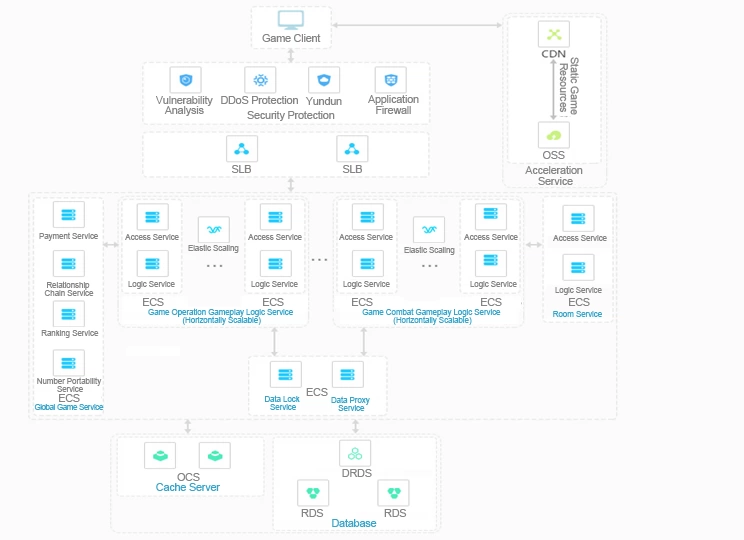Many gamers want to be able to play their games anytime, anywhere. This is the most prominent advantage provided by browser games. In terms of gameplay, browser games are primarily divided into traditional Massive Multiplayer Online Role Playing Game (MMORPG) and casual games. Casual games are the most popular type of online game and include farming, music, business, and racing games. These casual browser games have relatively low hardware requirements. Generally, gamers can use low-configuration computers or netbooks to play these games through a browser as long as they have Internet access. Browser game developers face several core technical challenges:
Alibaba Cloud provides a cloud computing platform to address the needs and challenges faced by browser games. This solution provides the following advantages:
Game Security
Secure and Stable Game Servers
Browser games often include many automated gameplay aspects where very little interaction is required from players. This leaves a space for the use of plug-ins. Therefore, it is necessary to introduce mechanisms to prevent players from using plug-ins to reap in-game benefits, thereby affecting the balance of the game's values system. Attacks pose another security risk with many browser games being vulnerable to a variety of attacks.
Through the protection offered by anti-DDoS IP addresses, WAF, penetration testing, and other Alibaba Cloud security services, the risk of frequent attacks on browser game servers can be avoided. This provides gamers with a more stable game service, while a series of anti-plug-in policies ensure a level playing field.
Elastic Resource Scalability
Elastic Resource Scalability
Casual social browser games are generally run on a social network. Some highly popular games experience a rapid surge of users. MMORPG games also constantly launch new servers to attract new players. In addition, browser games are usually short-lived. After a time, players become less active and gradually stop playing. Browser games also experience high and low peak periods, so they require server resources that support quick and reliable elastic scaling.
By combining Alibaba Cloud Server Load Balancer and ESS, developers can easily perform automatic online scaling for game logic servers to respond to sudden changes, such as the increased pressure on servers caused by drastic changes in the number of game users. This can also help users most efficiently use server resources.
Large Offline Interaction Data Read/Write Volume
Distributed Databases Supporting High Concurrent Access
To enhance user loyalty, SNS browser games generally all add offline gameplay aspects based on the relationship chain of social networks. This involves reading and writing large amounts of offline interaction data (far exceeding the amount of data to be processed for concurrently online players). Therefore, the games require a data storage solution that supports the concurrent reading/writing of mass data.
The Alibaba Cloud high-performance Relational Database Service and Distributed Relational Database Service combine to provide a database service supporting high concurrent read/write and horizontal extensions. In addition, database capacity and specifications can be flexibly adjusted according to different service cycles.
Static Game Content Acceleration Problem
Stable Static Game Content Acceleration
Browser games are non-client games, players must simultaneously play and download. This requires developers to combine download acceleration for some game content with dynamic resource loading policies in order to improve the gaming experience.
The Alibaba Cloud CDN possesses rich node resources and excellent image download performance. Combined with the Object Storage Service (OSS), it creates an integrated system for the storage, processing, and distribution of static browser game content. This provides convenient image processing and nearby download capability with a super-high throughput, delivering a stable and fast gaming experience for players. Moreover, the solution effectively reduces bandwidth and traffic costs.













